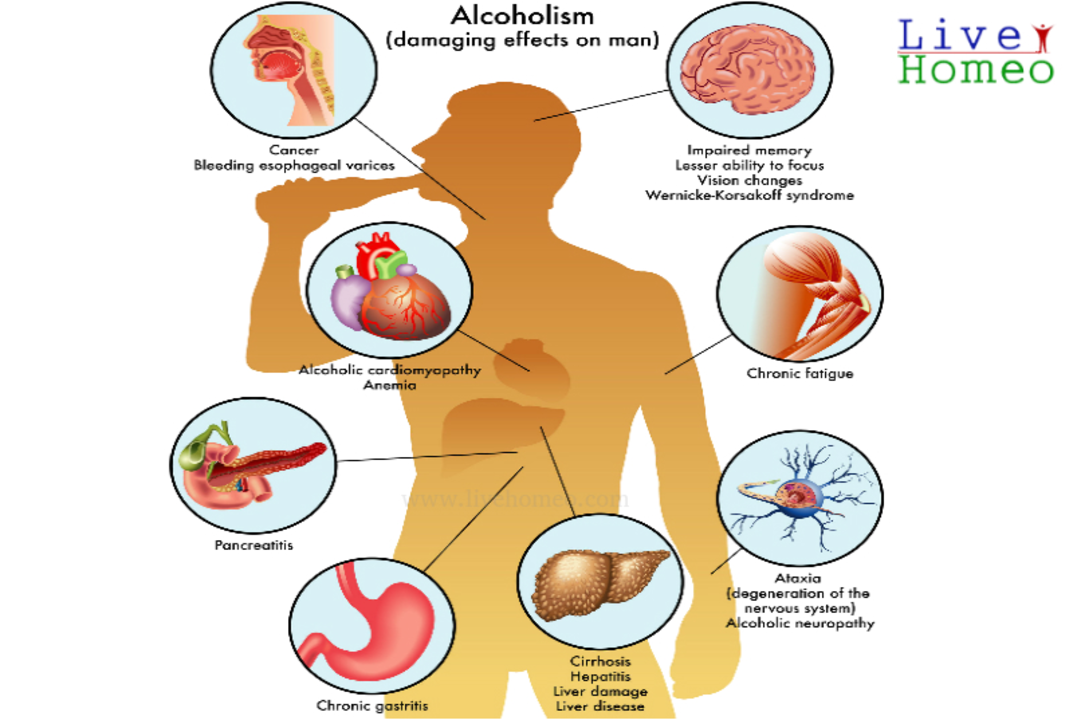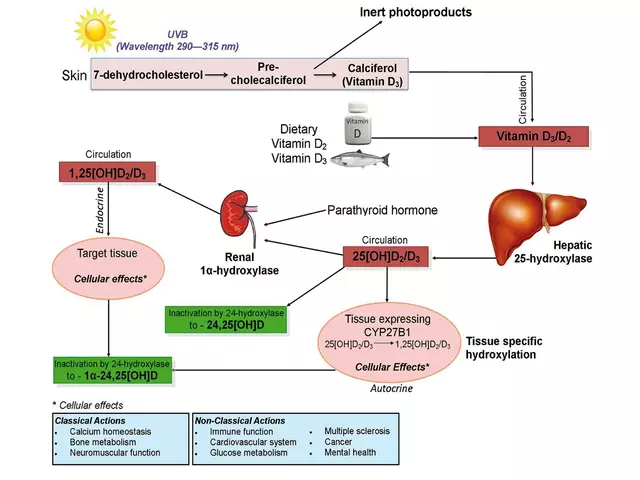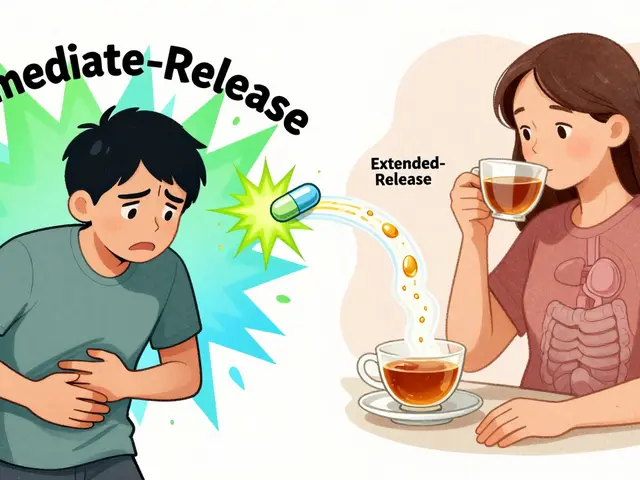Introduction: Alcohol and Uric Acid in the Body
As someone who enjoys an occasional drink or two, I've always been curious about the effects alcohol has on the body. Recently, I stumbled upon some information about the relationship between alcohol consumption and high uric acid levels. This piqued my interest, as I wanted to know if my drinking habits could potentially harm my health. In this article, we will explore the connection between alcohol and uric acid, and discuss ways to maintain a healthy balance.
Understanding Uric Acid and Its Role in the Body
Before we delve into the connection between alcohol and uric acid, it's important to understand what uric acid is and its role in the body. Uric acid is a waste product that is produced when the body breaks down purines - substances found in certain foods and drinks. It is normally dissolved in the blood, filtered by the kidneys, and then eliminated through urine. However, when the body produces too much uric acid or the kidneys don't eliminate it efficiently, it can build up and lead to health problems such as gout and kidney stones.
How Alcohol Affects Uric Acid Levels
Now that we know a bit about uric acid, let's discuss how alcohol consumption can affect its levels in the body. Alcohol, particularly beer and liquor, contains high amounts of purines, which can increase uric acid production. Additionally, alcohol can interfere with the kidneys' ability to filter uric acid, leading to higher levels in the bloodstream. This is because alcohol causes dehydration, which reduces the amount of urine produced, thus allowing uric acid to accumulate in the body.
Gout: A Painful Consequence of High Uric Acid Levels
One of the most well-known health issues associated with high uric acid levels is gout, a painful form of arthritis that often affects the big toe. Gout occurs when excess uric acid crystallizes and forms deposits in the joints, causing inflammation, pain, and swelling. Alcohol consumption, especially beer, has been shown to increase the risk of gout attacks due to its effect on uric acid levels.
Reducing the Risk: Moderation and Healthy Choices
So, what can we do to reduce the risk of high uric acid levels and related health problems? The key is moderation and making healthy choices. Limiting alcohol intake, particularly beer and liquor, can help keep uric acid levels in check. The American College of Rheumatology recommends that men with gout should have no more than two alcoholic beverages per day, and women should have no more than one. Additionally, staying well-hydrated can help the kidneys filter and eliminate uric acid more efficiently.
Other Factors That Influence Uric Acid Levels
It's important to note that alcohol consumption is just one factor that can contribute to high uric acid levels. Diet plays a significant role in managing these levels, as foods high in purines can also lead to increased uric acid production. Some examples of high-purine foods include red meat, organ meats, and certain types of seafood. Furthermore, some medications and medical conditions can affect uric acid levels, so it's essential to discuss any concerns with a healthcare professional.
In conclusion, understanding the relationship between alcohol consumption and high uric acid levels is crucial for maintaining a healthy lifestyle. By being mindful of our alcohol intake, staying well-hydrated, and making informed dietary choices, we can help keep our uric acid levels in check and reduce the risk of gout and other health problems. Cheers to a healthier future!







15 Comments
Hey everyone! If you're aiming to keep your uric acid levels in the green zone, think of moderation as your trusty sidekick. Swapping that extra pint of beer for a sparkling water can make a huge difference. And don’t forget to chug a glass of water between drinks – your kidneys will thank you! Stay motivated and toast to a healthier you!
Honestly, most of this is just common sense. Drink less, stay hydrated, that’s it. No need to overthink every little thing, people. If you keep thier diet in check, uric acid levels will stabilise, definetly.
Dear readers, let us approach this matter with optimism and a sense of shared responsibility. By conscientiously moderating alcohol consumption, we not only safeguard our joints from gout but also promote overall renal health. A balanced diet, abundant hydration, and mindful choices collectively forge a path toward wellbeing. May we all strive for such equilibrium with steadfast resolve.
Indeed, a measured approach to drinking can be both prudent and rewarding. By limiting intake-particularly of beer and spirits-we reduce the purine load that might otherwise overwhelm the body. Complement this with ample fluid intake, and you are effectively assisting the kidneys in their vital filtration duties. Such disciplined habits, though modest, can yield profound benefits for one's health and vitality.
Oh great, another lecture on drinking less. As if we needed a reminder that alcohol isn’t a miracle cure for everything.
While the advice may sound obvious, it’s worth acknowledging how easy it is to slip back into old habits. Supporting each other in making healthier choices can turn those reminders into real, lasting change. Let’s share tips and keep each other accountable, because together we’re stronger.
Honestly, it’s disappointing how many people think a couple of drinks won’t affect their health. The moral is clear: we must take responsibility for our bodies and refrain from casual overindulgence. Ignoring this only leads to preventable suffering.
Sure, blame the beer, but let’s not forget that genetics and overall diet play huge roles too. Pointing fingers solely at alcohol overlooks the bigger picture.
Hey friends! 🌟 Remember, staying hydrated is just as important as watching your drink count. Grab a water bottle, sip regularly, and your kidneys will thank you. You’ve got this, and I’m cheering you on every step of the way! 😊
Absolutely! 💧 Incorporating hydration habits can be a cultural bridge, connecting health practices across communities. Sharing a glass of water between sips of wine not only honors tradition but also promotes wellness. Let’s celebrate our diverse backgrounds while caring for our bodies! 🌍
It is a truth universally acknowledged that excessive consumption of alcoholic libations, particularly those rich in purines, can precipitate an elevation in serum uric acid concentrations, thereby engendering a predisposition to gouty arthropathy and nephrolithiasis; this observation, while seemingly straightforward, warrants a nuanced exploration of the underlying biochemical pathways, the renal excretory mechanisms, and the sociocultural factors that shape drinking behaviors. First, the metabolic degradation of ethanol yields acetaldehyde, a reactive intermediate that competes with uric acid for renal tubular excretion, consequently diminishing the clearance of the latter; second, the diuretic effect of alcohol induces a state of relative dehydration, which concentrates the uric acid in the plasma and reduces its solubility. Moreover, certain alcoholic beverages, such as beer, are imbued with substantial purine content derived from the fermentation of barley and yeast, further augmenting endogenous uric acid production. In addition, the role of hyperuricemia as a pro‑oxidant and pro‑inflammatory agent has been elucidated through myriad studies, indicating its involvement not merely in gout but also in hypertension, metabolic syndrome, and cardiovascular disease. Consequently, the recommendation to limit alcohol intake, particularly to no more than one to two standard drinks per day, is predicated upon a confluence of empirical evidence and clinical prudence. Hydration, on the other hand, serves as a countervailing force, promoting renal perfusion and facilitating the dissolution and excretion of urate crystals; thus, a daily intake of at least two liters of water is advocated. Dietary considerations, such as the avoidance of high‑purine foods-red meat, organ meats, and certain seafood-synergize with lifestyle modifications to attenuate serum uric acid levels. Finally, it bears emphasizing that individualized medical counsel remains paramount, as genetic polymorphisms in urate transporters (e.g., URAT1, GLUT9) can modulate susceptibility and response to therapeutic interventions. In sum, the interplay between alcohol consumption and uric acid homeostasis is multifaceted, demanding both patient education and clinician vigilance to mitigate the attendant health risks.
Got it. Drink less, drink water, stay healthy. Simple as that.
Just a heads‑up: cutting back on the nightly brew can really help keep those uric acid numbers down. It’s a small change that adds up over time.
Oh wow, because absolutely nobody reads the advice already plastered on every health site. If only we could all pretend that a single comment here will magically fix everything-what drama!
Moderation is key.